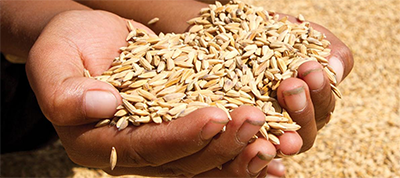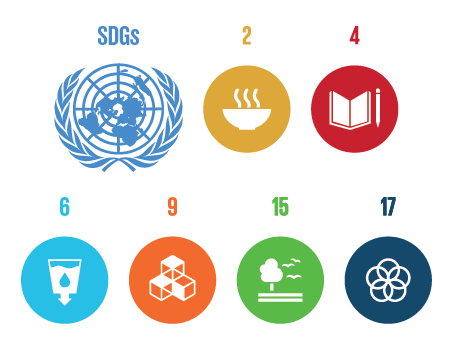Research and public engagement
A new Global Academy was launched in 2017, bringing experts together to find solutions to the world's key food issues.
Why study Agricultural Science?
Professor Geoff Simm discusses the many challenges facing modern society and how agricultural scientists can address them..
Global Academy of Agriculture and Food Security

Global Academy of Agriculture and Food Security
Public engagement

The 2016-17 academic year has seen a phase of significant development in the Cabaret of Dangerous Ideas event format. The level of researcher demand resulted in the programme for the 2017 Edinburgh Fringe doubling in size compared to previous years, from 24 events to 48. We have also seen more other organisations using this including at the 2017 Edinburgh International Science Festival, and Wellcome Trust’s Sick of the Fringe – London.
EU Researchers’ Night – known in Scotland as Explorathon – took place in Edinburgh on the last weekend in September, as did Fun Palaces. The former is a Europe-wide public engagement with research event; the latter is a grass-roots event programme designed to boost community engagement with the arts and sciences. Over 2,000 members of the public engaged across the two Beltane-led events.
The Edinburgh International Film Festival once again secured funding from the Wellcome Trust to work with Beltane on initiatives to bring together screenwriters and academic researchers. Four comedy-themed events took place in June 2017 as part of the Film Festival.
Institute of Academic Development
Beltane
The aim for 2017 was to make the Beltane Annual Gathering feel new and fresh, mirroring the thorough reconsideration of the Network’s work that was happening behind the scenes. Chesser House, the City Council’s former HQ and, most recently, a new community arts venue, was the venue. Attendees included the Big Hearts Community Trust and employees of the City of Edinburgh Council.
In 2017, we have seen two Scotland-wide formal public engagement networks begin to develop. These build on the strong informal links already in existence between Scottish university public engagement professionals. The University of Edinburgh has played a key role in setting up the network funded by the Wellcome Trust’s Institutional Strategic Support Fund.
Beltane has continued its strong relationships with the Scottish Parliament, and continues to provide support for the Scottish Parliament and Universities Knowledge Exchange Seminars. The Ask Academia mailing list, which Beltane helped establish, has been of direct interest to the Welsh and Northern Irish Assemblies.
In December 2016, the business plans for the long-term future of the Beltane Network were finalised and put out to Beltane’s past and potential future funding partners for consultation and support. The new plans included the provision of support for the University’s public engagement reporting in preparation for REF 2021, and – not unrelated – more support for University-internal coordination of public engagement support.
In terms of strategy, work to prepare the University’s first strategy for public engagement with research began in 2016/17, and the University responded, via Beltane, to a consultation run by the National Coordinating Centre for Public Engagement on public engagement in REF 2021.
Beltane Public Engagement Network
Responsible research and innovation
The NUCLEUS project, funded by the European Commission (Horizon 2020 Coordination and Support Action) has moved into its second phase. The project looks at how institutions can ensure they do research in a way that takes into account its potential positive and negative effects on society and the environment. Heather Rea is using her experience of working as part of the RCUK Beacons for Public Engagement to mentor colleagues at research institutions in Belgrade, South Africa, Twente and Malta.
Related links
Sustainable Development Goals Index

